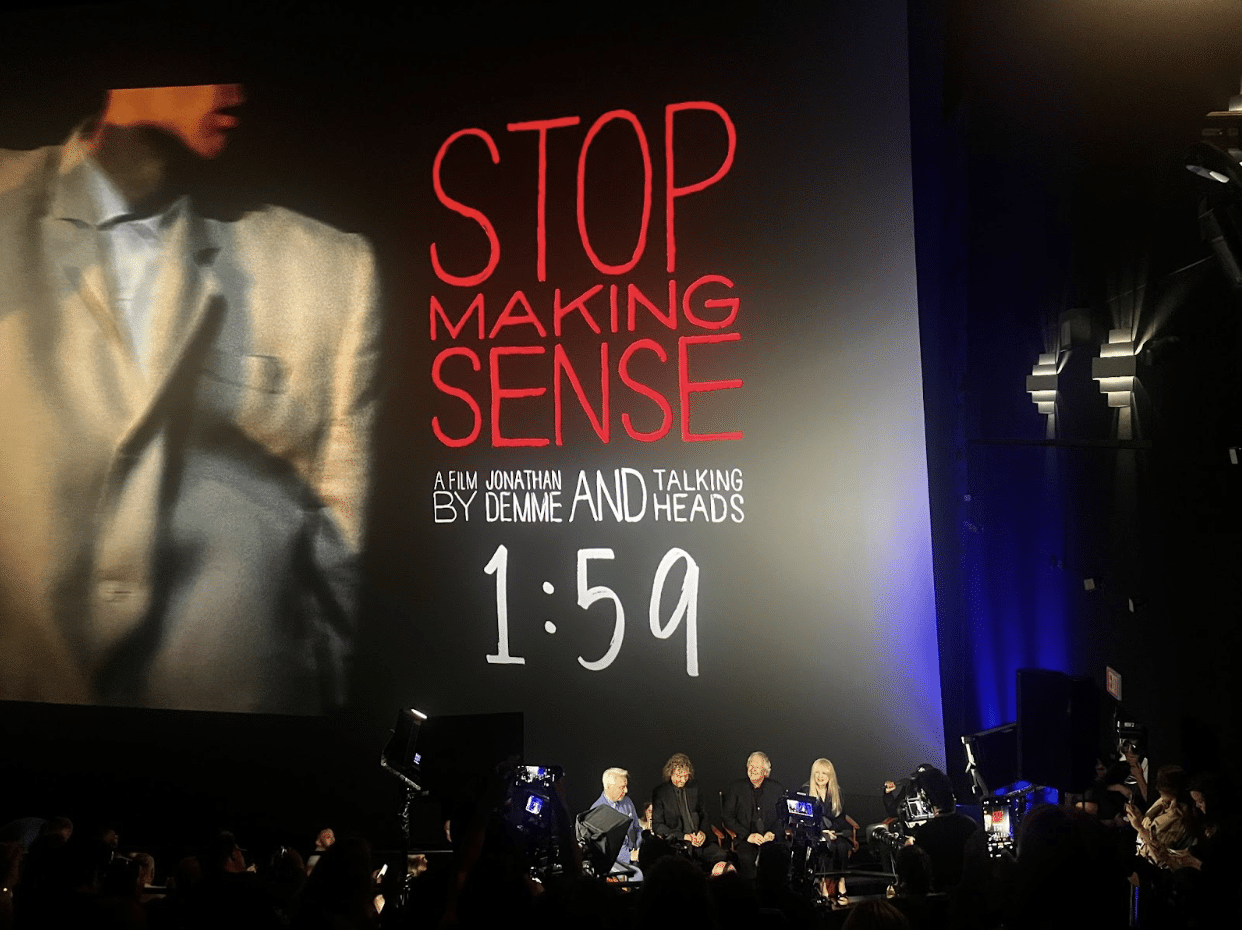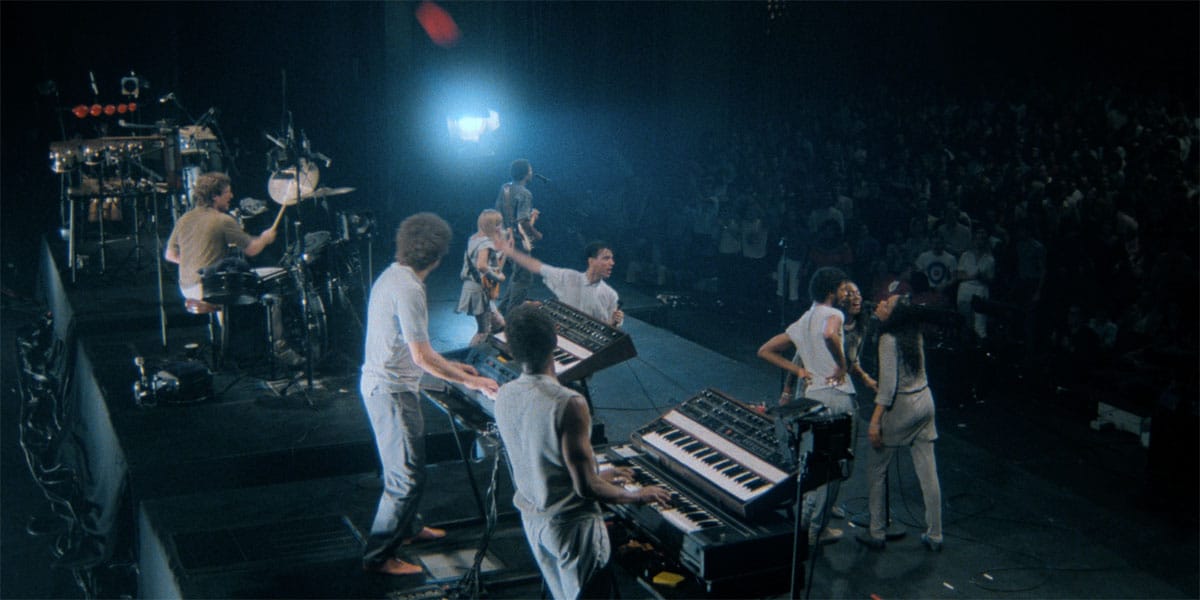Talking Heads’ concert film has rightfully claimed its place in the spotlight once again. Almost 40 years later, Stop Making Sense has returned to the big screen with the help of A24. Directed by Johnathan Demme, the film continues to be as relevant and cinematic as ever, acting as a fierce component of today’s most acclaimed concert films. Though it was originally released in 1984, the film can be regarded as simultaneously a timepiece and timeless. Recorded over several nights of performances at the Hollywood Pantages Theatre in 1983, director Johnathan Demme created something that would become a staple concert film for years to come.
The film opens with a lone vocalist, David Byrne, a boombox, and an acoustic guitar. Byrne, put together in a dapper grey suit and dress shoes, appears to be composed and formal, as if it was a job interview for a corporate rock-and-roll star. However, slowly, the singer performs a stripped-back version of Talking Heads’ most popular song, “Psycho Killer,” and as he stamps his foot along to the beat, it’s clear that this isn’t just a concert film, nor simply a concert or performance – it’s art, living and breathing on stage with meticulously planned coordination down to the smallest detail.
Next up, Talking Heads’ bassist Tina Weymouth joins Byrne on stage. During their gut-wrenchingly sincere performance of “Heaven,” the stage crew slowly begins to build the set. There’s something cathartic in watching this. Not only is each movement swift and purposeful, but it’s also cinematic and impactful. The stage crews’ effortless movements contribute to creating a surreal atmosphere. This film was incredible for its time, as the unique filming angles and techniques didn’t necessarily follow the format of the typical concert film. Arguably, the film is even more incredible 40 years later, with minimal runners up for “best concert film.”
During the premiere at TIFF, attendees danced in the aisles, sang along, and clapped between tracks in the theatre. It mimicked the feeling of being at a live concert for those of us who wished to have been born 40 years earlier, and those who wish to go back to when they were 40 years younger. Before the crowd knew it, Weymouth and Byrne’s counterparts, drummer Chris Frantz and guitarist/keyboardist Jerry Harrison, had joined them on screen along with the backup singers, percussionists and keyboardists.
Then, the whole stage erupts into the infectious song “Burning Down the House.” It’s so intense that it could be described it as a crescendo, but it doesn’t make sense to say that the film peaks, or even plateaus at any point. Stop Making Sense stays in an everlasting climb upwards, right up until the credits roll.
Stop Making Sense was remastered from the original tapes in 4K and adapted to IMAX. A24’s beautiful remaster only enhances the electricity, chemistry, and pure euphoria that the film produces both on the screen and in the audience. When Stop Making Sense was filmed, Talking Heads were at the peak of their careers. By the nineties, the band was essentially disbanded, in part due to a significant rift between Byrne and the other three members. In 1992, Frantz said in an interview with the Los Angeles Times that “as far as [they were] concerned, the band never really broke up. David just decided to leave.”
In addition to A24 bringing this classic film back to theatres, the New York City-based film company brought together all four members of Talking Heads for the film’s premiere at the Toronto International Film Festival. For the first time in more than 20 years, Byrne, Weymouth, Frantz and Harrison appeared together for a Q&A. The band’s past rifts seemed to be paved over, as an aura of nostalgia and endearment flowed between the members. Moderated by Director Spike Lee, the Q&A was mainly composed of reflections on the process of making Stop Making Sense. Various anecdotes were shared; how Frantz wished he had been a bit less vocal during “Genius of Love;” Weymouth joking that the best thing she did for the band was turning down her bass amp; and of course, Byrne’s iconic oversized suit.

In the Q&A, Byrne explained that between tours he had spoken with a fashion designer in hopes of brainstorming the band’s new “look” for the upcoming tour. The designer, Jurgen Lehl, told him that “in the theatre, everything is just bigger than real life,” meaning the gestures and the volume. Byrne took it literally, and thought that “[his] suit should be bigger too.”
During the “Girlfriend is Better” sequence of the film, Byrne emerges in a suit that is at least six sizes too big, complete with excessive amounts of padding. As a tiny, talking head against his large, suited body, Byrne produces an electrifying performance. The lyrics in the song allude to the film’s title as he exclaims the words “stop making sense” over and over, and ends off with “and nothing is better than this,” before the audience erupts into a sea of applause. This part of the film acts as a very powerful symbol of youth as evident in the playfulness and carefree nature expressed on stage by all members of the band. While Byrne, Weymouth, Frantz and Harrison were all in their thirties during the filming of Stop Making Sense, in some way, it feels like the band is looking ahead at life’s responsibilities and challenges, and waving goodbye to their lives as they knew them.
A24’s promotional video featuring David Byrne trying on his famous suit 40 years later.
Stop Making Sense officially hit theatres on September 22, 2023. Now, with A24’s re-release, a whole new generation of people will be able to enjoy Johnathan Demme’s incredible knack for cinematography, and Talking Head’s musicianship. If A24’s label of “best concert film of all time,” and the impact it has already made in the last 40 years isn’t enough, the film’s re-release will be enough for Stop Making Sense to go down in the books as one of the greatest concert films of all time.









